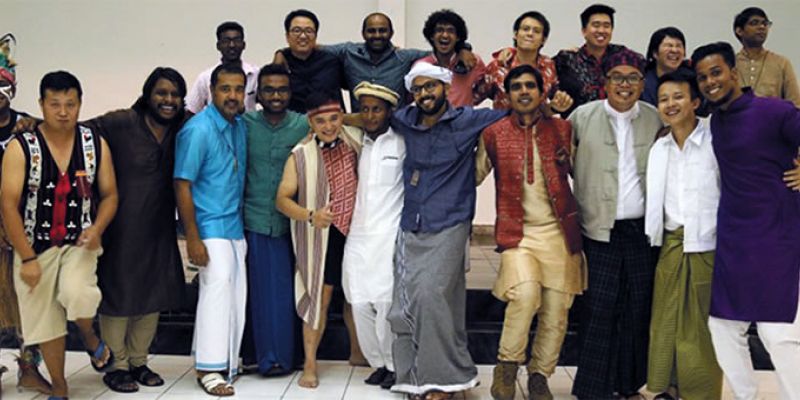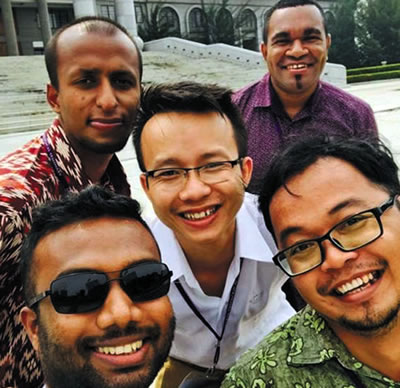
The Journey of Friendship and Dialogue
I was born in a predominantly Christian city in the Philippines. Iligan City is about an hour’s drive from Marawi City, a city that was declared as the “Islamic City of the South Philippines.” Growing up, I had a few Muslim classmates, and we were good friends. Yet our communities did not necessarily see eye to eye. We saw each other as traitors. As a pastor now, I went through a lot of formation that demands interaction and encounters with my Muslim neighbors, and that opened my eyes to the truth that we are one despite our many differences.
There are many conflicts around the world today. The refugee crisis caused by all these misunderstandings, biases and even hate towards each other is something we should all look into. We are all refugees in this world. It is better to help one another than drown each other in the sea of hate and anger.

It is with this thought in mind that I wanted to deepen my engagement with peoples of other faith traditions than Christianity. Now I am working in Myanmar, a predominantly Buddhist nation with a lot of minority groups like Christians, Hindus and Muslims. This year’s Youth in Asia Training for Religious Amity (YATRA) theme “Passionately Christian and Compassionately Interreligious” is very challenging at a time that is very exciting and difficult for many Christians. Everywhere we see Christian values are being challenged but in a good way engaged. How do I as a Christian be both passionate about my faith but also compassionate with others? How do I bear witness to the words of Jesus Christ such as love thy neighbor like I love myself or even when I am considered an enemy by the other – how do I live with them and love them? How do I enter into dialogue with them?
These are some of the things I hoped to learn and gain from the YATRA experience. I think the best thing I can get from the whole experience is the friendships I hope to build with people, young people who are what Dr. Jose Rizal, my national hero considers as the hope of the future.
Above was part of an essay I wrote as an application to this year’s edition of the YATRA. Yatra is a Sanskrit word for journey. And I was not disappointed. I discovered friendship and dialogue in the space of two weeks. I set off from Yangon, Myanmar, on what would be an adventure of a lifetime. I joined 33 other young people from all over Asia, along with countries and regions like Australia, Bangladesh, China, Hong Kong, India, Indonesia, Japan, Malaysia, Myanmar, New Zealand, Pakistan, the Philippines, Sri Lanka and Taiwan. We all came from different Christian traditions. We were hosted by the very progressive Jakartaa Theological Seminary.
The two-week program included sessions on the different faith traditions (Islam, Hinduism, Buddhism) and atheism. Interactive sessions included visits to various faith sacred spaces like temples and churches. Theological reflections and Bible studies helped deepen our understanding of dialogue. Worship groups provided creative and reflective morning prayer spaces allowing young people to lead the group in worship through songs and dances. The two-week program achieved two kinds of dialogue: interreligious and ecumenical dialogue. The other highlights were visits to different churches that are actively living out interreligious dialogue and the cultural night which showcased the talents of the participants. As for me, I represented Myanmar. I sang and danced with my partner, Samuel, an Anglican deacon also from Myanmar.
We experienced Indonesian hospitality. Indonesia is considered a very tolerant society, although largely Muslim. But over time, conflicts among the Christian and Muslim population erupted, leading to many deaths on both sides. Places like Aceh and Ambon were the sites of such conflicts. But what was interesting were the stories of hope and transformation after the conflicts.
The theological reflections provided by different Christian theologians broadened my understanding of the Christian identity and mission. I would like to highlight these two points: first, the hospitality and friendship in the Trinity and second, the spaciousness of God.
One speaker pointed out to us the icon of the Trinity. In between the three persons of the Trinity is space. The space between them for me can be understood as the space or freedom the Trinity gives each other and to us. On hospitality, I remember the story of the walk to Emmaus–where the guest, who was Jesus invited by the two disciples becomes the host–in the breaking of the bread and he becomes the bread broken and shared himself. On the spaciousness of God, it allows God to be both familiar and strange. The Trinity is the mystery that unfolds in our experience of both suffering and death, but also of happiness, joy and life.
There were so many aspects of Islam, Hinduism and Buddhism I learned that deepened my own Christian faith. Islam taught me about the attitude of surrendering to God. Buddhism taught me more about karuna or compassion. And Hinduism pointed out to me the law of karma, or everything has a cause and effect. There are three things I took from the two weeks of intense dialogue: how to yearn for one’s purpose of life and the truth; show respect for others; and allow God, others and myself the space to be.
The young people I met were yearning for their own purposes in life. They came from different backgrounds: students, social workers, bankers, youth pastors, deacons, theologian-professors, teachers, media content managers, and software developers. But their Christian identity made them more than their professions. They wanted to seek more in life. They wanted to seek the truth. What is the Christian identity and mission? They were passionately Christian.
I also learned that respect is very important when we relate to people. Although we do not know much about each other, respect allows us to see the other as we do ourselves. It makes us more considerate, tolerant and accepting of each other. Respect is very important in dialogue.
One thing that really stuck with me was the talk on the spaciousness of God. God cannot be limited by our human understanding that He can and will only look after Christians. He has to be bigger than that. God is a spacious God. Let us allow God to be. And if we allow God to be what He is then we should also give each other space to be who we are. My YATRA family have shown me how to be compassionately inter religious but more so compassionately ecumenical.
The end of the two-week journey with 33 young women and men was the beginning of a greater adventure – that of being passionately Christian and compassionately interreligious in our respective families, communities, churches, and countries. Thank you to the YATRA family, the World Council of Churches and Jakarta Theological Seminary.
Fr. Kurt Zion Pala lives and works in Myanmar.


 The Columbans are a society of missionaries, including priests and lay people, who minister to people of various cultures as a way of witnessing to the universal love of God.
The Columbans are a society of missionaries, including priests and lay people, who minister to people of various cultures as a way of witnessing to the universal love of God.